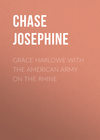Loe raamatut: «Marjorie Dean, High School Junior»
CHAPTER I – MARJORIE DECLARES HERSELF
“Only to think, next week, at this time, I’ll be saying good-bye to you, Mary Raymond.” Marjorie Dean’s brown eyes rested very wistfully on the sunny-haired girl beside her in the big porch swing.
“You know now, just how dreadfully I felt two years ago when I had to keep thinking about saying good-bye to you,” returned Mary in the same wistful intonation. “It was terrible. And after you had gone! Well – it was a good deal worse. Oh, Marjorie, I wish I could live this last year over again. If only – ”
Marjorie laid light fingers on Mary’s lips. “You mustn’t speak of some things, Lieutenant,” she said quickly. “If you do I won’t listen. Forget everything except the wonderful summer we’ve had together.”
Mary caught the soft little hand in both hers. “It has been wonderful,” she agreed rather unsteadily. “I’ll have the memory of it to treasure when I’m away off in Colorado. I can’t believe that I am really going so far away from you. I hope I’ll like the West. Next summer you must come out there and visit me, Marjorie. By that time I’ll be a little bit at home in such a strange, new country.”
“I’d love to do that,” responded Marjorie with an eagerness that merged almost immediately again into regretful reflection.
A sad little silence fell upon the two in the porch swing. Each young heart was heavy with dread of the coming separation. This was the second time in two years that the call to say farewell had sounded for Marjorie Dean and Mary Raymond.
Those who have followed Marjorie Dean through her freshman and sophomore years at high school are already familiar with the details of Mary’s and Marjorie’s first separation. In “Marjorie Dean, High School Freshman,” was recorded the story of the way in which Marjorie had come to leave her chum at the beginning of their first year in Franklin High School, in the city of B – , to take up her residence in the far-off town of Sanford, there to become a freshman at Sanford High. In her new home she had made many friends, chief among them Constance Stevens, to whom she had been greatly drawn by reason of a strong resemblance between Constance and Mary. In an earnest endeavor to bring sunshine to the former’s poverty-stricken lot she had thereby involved herself in a series of school-girl difficulties, which followed her throughout the year. True to herself, Marjorie met them bravely and conquered them, one by one, proving herself a staunch follower of the high code of honor she had adopted for her own.
With the advent of Mary Raymond into her home for a year’s stay, Marjorie was confronted by a new and painful problem. “Marjorie Dean, High School Sophomore,” found Marjorie enmeshed in the tangled web which Mary’s jealousy of Constance Stevens wove about the three girls. Led into bitter doubt of Marjorie by Mignon La Salle, a mischief-making French girl who had made Marjorie’s freshman days miserable, Mary Raymond had been guilty of a disloyalty, which had come near to estranging the two girls forever. It was not until their sophomore year was almost over that an awakening had come to Mary, and with it an earnest repentance, which led to equity and peace.
It was to this which Mary had been about to refer mournfully when Marjorie’s gentle hand had sealed her repentant utterance. All that summer the two girls had been earnestly engaged in trying to make up for those lost days. Constance and Mary were now on the most friendly terms. The three had spent an ideal month together at the seashore, with no hateful shadow to darken the pleasure of that delightful outing. Later Constance had left them to spend the remainder of her vacation with her family in the mountains. The Deans had lingered in their seaside cottage until the last of August. Now September had arrived, her hazy hints of coming Autumn reminding the world at large that their summer playtime was over.
To Mary Raymond it was a pertinent reminder that her days under the Deans’ hospitable canopy were numbered. In fact, only seven of them remained. On the next Friday morning she would say her last farewells to speed away to Denver, Colorado, where, on her invalid mother’s account, the Raymonds were to make their home. So it is scarcely to be wondered at that Marjorie and Mary were decidedly melancholy, as they sat hand in hand, bravely trying to meet the trial which lay before them.
“I wonder if Jerry will come home to-day.” Marjorie rose from the swing with an abruptness that set it to swaying gently. The weight of parting had grown heavier during that brief silence and she was very near to tears.
“I don’t know. Her letter said Thursday or Friday, didn’t it?” Mary’s voice shook slightly. She, too, was on the verge of a breakdown.
“Yes.” Marjorie’s back was toward Mary as she answered. She walked to the end of the spacious veranda and gazed down the pebbled drive. Just then she felt as though the sight of Geraldine Macy’s round, good-humored face would be most welcome. Slowly returning to where Mary still sat, she said: “As this is Friday, Jerry will surely – ”
“Marjorie!” called a clear voice from within the house. “The telephone is ringing.”
“Coming, Captain!” Marjorie quickened to sudden action. “I hope it’s Jerry,” she flung over her shoulder as she ran to the open door. “Come on, Mary.”
Mary needed no second invitation. By the time Marjorie had reached the telephone, she was only a step behind her chum.
“Hello! Yes, this is Marjorie. Oh, Jerry!” Marjorie gave a little squeal of delight. “We were just talking of you. We wondered if you’d be home to-day. Won’t you come over now? You will? Well, then, hurry as fast as ever you can. We’re crazy to see you. Mary wants to talk to you. Just say ‘hello’ to her and hang up the receiver.” Marjorie cast a playful glance at the girl beside her. “You can talk to her when you get here.”
Marjorie held the receiver toward Mary, who greeted Jerry in brief but affectionate fashion and obediently hung up. “Always do as your superior officer tells you,” she commented with a smile.
“That’s pure sarcasm,” retorted Marjorie gaily. “The question is, am I your superior officer or are you mine? This business of both being lieutenants has its drawbacks. We can never know just who’s who.”
“I ought to be second lieutenant and you first,” demurred Mary soberly. “I didn’t deserve to become a first with you last June after – ”
“Mary!” Marjorie cried out in distressed concern. Her brown eyes were filled with tender reproach. “Aren’t you ever going to forget?”
“I can’t.” Mary turned her face half away, then the flood of sadness she had been fighting back all afternoon overtook her. Stumbling to the stairs she sat down on the lowest step, her face hidden in her hands, her shoulders shaking.
“Poor, dear Lieutenant.” Her own eyes overflowing, Marjorie dropped down beside Mary and wound her arms about the dejected figure.
“This is a nice reception! I see I shall have to welcome myself. Why, how are you, Geraldine? Boo, hoo! It’s a wonder you wouldn’t ring. You never did have any manners. I don’t see why you called, anyway. Boo, hoo!”
The first sound of a loud, cheerful voice brought the weepers to their feet. A loud, anguished “Boo, hoo!” sent them into half-tearful giggles.
“That’s more like it,” approved the stout girl in the doorway, her round face alive with kindly solicitude. “If I had sensitive feelings I might think you were crying because you’d invited me to call. But I haven’t. Hal says I am the most unfeeling person he knows. He only says that when his little sister can’t see things the way he does.”
Jerry rattled off these pleasantries while in the midst of a rapturous embrace, bestowed upon her plump person by two now broadly-smiling mourners.
“It’s splendid to see you again, Jerry,” caroled Marjorie, hugging her friend with bearish enthusiasm. Mary echoed Marjorie’s fervent greeting.
“The mere sight of me is always inspiring,” grinned Jerry, winding an arm about each friend. “I hope you have both noticed by this time that I am a great deal thinner than I was last June. I’ve lost two pounds. Isn’t that some loss?”
“Perfectly remarkable,” agreed Marjorie mischievously. “Come on out on the veranda, Jerry. We have such a lot to talk about.”
Four determined, affectionate arms propelled Jerry to the wide, vine-decked porch, established her in the big porch swing, and climbed in beside her.
“Now, tell me, children, why these weeps?” Jerry demanded practically, still retaining her loving hold of her two friends.
“They’ve been on the way all day,” confessed Marjorie. “We’ve both tried not to cry, but – somehow – ” Her voice faltered. “You see, Jerry, this is Mary’s and my last week together. Mary’s going away off to Colorado next week.”
“You don’t mean it?” Jerry sat up very straight, looking wide-eyed concern. “You never said a thing about it in your letter. I mean letters. I believe you did write me two.” Jerry registered comical accusation.
“Don’t remind me of my sins of omission,” Marjorie laughed, flushing a trifle. “I always mean to write, but somehow I never do. We didn’t know until the week before we came from the seashore that Mary would have to go so soon. We thought it wouldn’t be until November.” Again her tones quavered suspiciously.
“I see.” Jerry frowned to hide her own inclination to mourn. During the brief time they were thrown together, after the reunion of Marjorie and Mary, she had learned to know and love the real Mary Raymond. “I’m more sorry than I can say. I thought we’d all be together for our junior year at Sanford High.”
“Of course, I am anxious to be with mother and father,” put in Mary loyally, “but I hate to leave Sanford. There are lots of things I meant to do this year that I didn’t do last year.”
“But you can’t be in two places at once,” was Jerry’s blunt consolation. “Never mind, Mary, you can come back to visit us and we’ll write you lots of letters. Marjorie is such a splendid correspondent.” Her accompanying jolly chuckle robbed this last pertinent fling of offence. “We’ll write you all the news. That reminds me, I’ve some for you girls. You’ll never guess who stayed at the same hotel with us this summer. I didn’t write about it, because I wanted to have it to tell when I came home.”
Mary cast a sidelong glance at the stout girl. There had been a faint touch of disgust in Jerry’s intonation. “Was it – Mignon?” she asked, half hesitant.
“Right you are. How did you guess it?”
“Oh, I just wondered,” was Mary’s brief response. A tide of red had risen to her white skin, called there by distressing memories.
“Yes, it was our dear Mignon,” continued Jerry briskly. “And she has a friend, Rowena Farnham, who likewise stayed at our hotel. Believe me, they were a well-matched pair. You see the La Salles usually go to Severn Beach every summer, but they always stay at Cliff House. We always go to the Sea Gull. That’s the whole length of the beach from their hotel. Imagine how pleased I was to see Mignon come parading down to dinner one evening, after we’d been there about two weeks. I was so disgusted that I wanted my father to pack up and move us over to Cliff House. But he wouldn’t, the hard-hearted person.
“That is only part of my tale. The worst now comes trailing along. It’s about this Rowena Farnham. It seems that the Farnhams moved to Sanford last June just after school closed and – ”
“Is this Rowena Farnham a very tall, pretty girl with perfectly gorgeous auburn hair and big black eyes?” broke in Mary abruptly.
“Yes. Where did you ever see her?” demanded Jerry. “Where was I that I didn’t?”
“Oh, I saw her one day in the post-office with Mignon. It was after you had gone away. I thought she must be a guest at the La Salles’.”
“You thought wrong. She lives in that big house with the immense grounds just the other side of the La Salles’ home. It’s the one with that terribly high, ornamental iron fence. I always used to call it the Jail. It made me think of one. But that’s not my news, either. This new girl is going to be a sophomore at Sanford High. I’m sorry for poor old Sanford High.”
“Why?” A curious note of alarm sprang into Marjorie’s question. After two stormy years at high school, she longed for uneventful peace. Jerry’s emphatic grumble came like a far-off roll of thunder, prophesying storm.
“Why?” Jerry warmed to her subject. “Because she is a terror. I can see it in her eye. Just now she and Mignon are as chummy as can be. If they stay chummy, look out for trouble. If they don’t, look out for more trouble.”
“Perhaps you may find this new girl quite different,” suggested Mary hopefully. “It’s not fair to judge her by Mignon. Very likely she hasn’t any idea that – that – ” She was thinking of how completely she had once fallen under Mignon’s spell.
“That Mignon is Mignon, you mean,” interrupted Jerry. “She ought to know her after being with her all summer. I’ll bet she does. That’s just why I think she’s a trouble-maker. They always hang together, you know.”
Marjorie slipped from the swing and faced her friends with the air of one who has suddenly arrived at a definite conclusion. For a moment she stood regarding Jerry in silence, hands clasped behind her back.
“There’s just one thing about it, Jerry,” she began firmly, “and that is: I will not have my junior year spoiled by Mignon La Salle or her friends. Last year we tried to help Mignon and our plan didn’t work. I thought once that she had a better self, but now it would take a good deal to make me believe it. She caused me a great deal of unnecessary unhappiness and she almost made Constance lose her part in the operetta. And little Charlie! I can’t forgive her for the way she treated that baby. This year I am going to go on with my school just as though I had never known her. I hope I won’t have to play on the same basket ball team with her or against any team that she plays on. I’ve had enough of Mignon La Salle. I’m going to steer clear of her.”
CHAPTER II – ALL IN HONOR OF MARY
“Be sure not to pack your white lace dress, Lieutenant.” Marjorie delivered this reminder from the open doorway of the pretty blue room which Mary had so long regarded as her own special nook.
From a kneeling position before her trunk Mary Raymond turned her head, her eyes two mournful blue stars. “It’s over there,” she returned, nodding somberly toward the bed. “Everything else that had to be packed is packed. I can put my dress in the last thing to-night. I’m so glad Connie is home in time to see me off on my journey. I hope she and Charlie will come over early this afternoon.”
“They will.” The blithe assurance held a significance which Mary did not catch. The shadow of the coming separation now hung more heavily upon her. Marjorie’s cheery reply caused her to wonder vaguely if her chum would really miss her so very much. The next instant she put the thought away from her as unworthy. Of course Marjorie would miss her. Still she could scarcely be blamed if she did not. In spite of the long, happy summer they had spent together, occasionally the past rose to torture Mary.
Packing her effects had been a severe trial. Everything she touched called forth memories. There was the blue linen frock she had worn on the morning of her first entrance into Sanford High School. The very sight of it filled her with remorse. And the dress she had worn on Christmas Day, when the merciful Flag of Truce had bade a halt to the hostilities which her own unreasonable jealousy had created. More than one tear had fallen on the various dainty articles of wearing apparel as she consigned them to her trunk. She wished above all to be brave and cheerful, even to the very moment of farewell, but she found it hard to fight back the terrible feeling of oppression that clutched at her heart.
From her position in the doorway, Marjorie had watched Mary for a moment or two before speaking. She had guessed that the work of packing would be something of a dolorous labor, which Mary might prefer to perform alone. At heart she, too, was sad, but in her mind lurked a pleasant knowledge which for the present Mary did not share. It was this particular bit of knowledge that made it difficult for her to keep a sober face as she met Mary’s doleful gaze.
“I’m going to wear white, too,” she said brightly. “Captain finished my new lingerie frock yesterday. As long as you’re through packing, why not get dressed for dinner now? I’m going to, even if it is only three o’clock. Then when Connie and Charlie come we can take a stroll down to Sargent’s. That is, if we care to.” Again her lovely face threatened to break forth into the smiles.
“All right.” Mary’s acquiescence came rather listlessly. Rising from the floor she began somewhat spiritless preparations toward making ready to receive the expected guests.
“I’m going to my house now to put on my costliest raiment.” Flashing a mischievous glance toward Mary, Marjorie disappeared from the doorway and tripped down the hall. Once inside her “house,” as she had whimsically named her pink and white room, she executed a gleeful little dance for her own benefit. “She doesn’t suspect a thing,” was her jubilant comment.
But while the two girls were engaged in arraying themselves to do honor to Constance, a most peculiar state of affairs was in progress downstairs. Through the wide flung hall door, one after another flitted a mysterious procession of girls, moving with the noiseless tread of a flock of ghosts. Their bright-eyed, smiling faces and gala attire, however, marked them as being particularly human. One of the seven specters bore a strong resemblance to Mary herself, and the diminutive black-eyed sprite she led by the hand seemed on the verge of breaking forth into an ecstatic flow of joyful sounds.
Apparently, Mrs. Dean had also been suddenly bereft of speech. Only her twinkling eyes and smiling lips gave sign of just how greatly welcome were her silent guests. Ushering them into the living room she nodded brightly, laid a warning finger to her lips and softly withdrew, pulling together the silken portieres. A half-smothered giggle, to which no self-respecting ghost would have stooped to give utterance, followed her. Then profound stillness reigned within.
“Are you ready, Mary?” A bewitching, brown-eyed vision in white pranced in upon Mary as she was slowly adjusting the soft loops of her wide, white ribbon sash. “Let me tie your sash.” Marjorie’s nimble fingers set themselves to work. “There you are. You do look so perfectly sweet in white. Now smile and say prettily, ‘Thank you for them kind words, Miss Marjorie.’ That’s what Delia always says when she dresses up and I tell her how fine she looks.”
Marjorie’s buoyant spirits were so irresistible as to bring the coveted light into Mary’s mournful eyes. “Forward, march! Here we go.” Seizing Mary gently by the shoulders she marched her down the hall to the stairway. “Break ranks,” she ordered. “The gallant regiment can’t afford to tumble downstairs.”
“Halt!” came the order, as Mary reached the lower hall a step ahead of her commander. “We will now make an invasion on the living room. Two’s right, march!”
Mary obediently marched. Of her own accord she came to an abrupt halt. “Oh!” she gasped. Her amazed exclamation was drowned in a chorus of gleeful shouts as seven very lively apparitions closed in around her.
“Charlie never said a word!” shrieked a high, triumphant voice. “We comed to see you. Hooray!” A small, joyful figure hurled itself straight into Mary’s arms. She stooped and hugged him close, her golden head bent to the youngster’s. Straightening, she glimpsed the affectionate circle of girls through a mist of unbidden tears. “I’m so glad and so surprised to see all of you,” she faltered. “And you knew it all the time!” She caught Marjorie’s hand.
“Of course I knew it. Now we are even. You gave me a surprise party once, so I thought I’d return the compliment,” laughed Marjorie. “I could hardly keep it to myself, though. Every time I looked at you I wanted to say, ‘Cheer up, the best is yet to come.’”
“It’s a good thing it wasn’t long coming,” retorted Jerry Macy. “I never knew how much I liked to talk until I had to keep still.”
“You must have slipped into the house like shadows,” declared Mary happily. Her sad expression had quite vanished with the unexpected honor that had been done her. She felt that, after all, she held some small place in the affections of Marjorie’s intimate friends, and the cloud of doubt that had obsessed her rolled away.
“We did do that arriving stunt rather well,” was Harriet Delaney’s complacent comment. “Of course, Susie giggled. We expected she would, though. The rest of us were above reproach.”
“No wonder I giggled,” defended Susan Atwell. “If you had been the last one in line you’d have laughed, too. You girls looked as if you were trying to walk on eggshells, and when Jerry crossed the room in about three steps, it was too much for me.” Susan’s cheerful chuckle broke forth anew and went the rounds.
“Well, children, what is your pleasure?” inquired Marjorie. “Shall we stay here, or sit on the veranda, or establish ourselves in the pagoda, or what?”
“The pagoda for mine,” decided Jerry, “provided the rest of you are of the same mind. We can sit in a circle and tell sad stories of the deaths of kings, etc. All those in favor of this lively pastime please say ‘Aye;’ contrary, keep quiet.”
“Aye,” came the willing response.
“What for is ‘Aye?’” calmly demanded Charlie Stevens of Mary, to whom he had immediately attached himself.
“Oh, it means that Charlie can go out with us to the summer house and have a nice time, if he would like to,” explained Mary.
“Charlie don’t want to,” was the frank response. “Where’s Delia?” Fond recollections of frequent visits to the Dean kitchen, invariably productive of toothsome gifts, lurked in the foreground. “Delia likes to see me.”
“You mean you like to see Delia,” laughed Constance. “But you know you came to see Mrs. Dean and Marjorie and Mary,” she reminded.
“I’ve seen them. Now I have to see Delia.”
“Delia wins the day,” smiled Mrs. Dean. “You are all jilted. Very well, Charlie, you and I will pay our respects to Delia. Come on.” She stretched forth an inviting hand to the little boy, who accepted it joyfully, and trotted off with her to invade good-natured Delia’s domain.
“As long as our one cavalier has been lured away from us by Delia we might as well try to console one another,” laughed Marjorie.
“He’s growing terribly spoiled,” apologized Constance. “My aunt adores him and thinks he must have everything he asks for. He’s a good little boy, though, in spite of all the petting he gets.”
“He’s a perfect darling,” dimpled Susan Atwell. “He says such quaint, funny things. Has he ever tried to run away since the night of the operetta?”
“No.” Constance made brief reply. Her gaze wandered to Mary Raymond, who was talking busily with Harriet Delaney and Esther Lind. The vision of a fair-haired, blue-eyed girl, leading a small runaway up to the stage door of the theatre rose before her. Next to Marjorie Dean, Mary ranked second in her heart. Constance felt suddenly very humble in the possession of two such wonderful friends. Life had been kinder to her than she deserved was her grateful thought.
Susan eyed her curiously. Although she was very fond of Constance, she did not in the least understand her. Now she said rather timidly, “I hope you didn’t mind because I spoke of the operetta and Charlie’s running away, Connie?”
Constance promptly came out of her day-dream. “You brought it all back to me,” she smiled. “I was just wondering what I’d ever done to deserve such friends as I’ve made here in Sanford. I can’t bear to think that Mary won’t be with us this year.”
Before Susan could reply, Jerry interrupted them with, “Come along, girls. The sooner we get settled the longer we’ll have to talk.”
It was a merry, light-hearted band that strolled out of the house and across the lawn to the honeysuckle-draped pagoda, situated at the far end of the velvety stretch of green. Mary and Marjorie brought up the rear, their arms piled high with bright-hued cushions, and the guests soon disposed themselves on the bench built circular fashion around the pagoda, or sought the comfort of the several wicker chairs.
Brought together again after more than two months’ separation, a busy wagging of tongues was in order, mingled with the ready laughter that high-spirited youth alone knows. Everyone had something interesting to tell of her vacation and rejoiced accordingly in the telling. Father Time flew in his fleetest fashion, but no one of the group paid the slightest attention to the fact. From vacation, the conversation gradually drifted into school channels and a lively discussion of junior plans ensued.
“By the way, girls,” remarked Jerry Macy with the careless assumption of casualty which was her favorite method of procedure when about to retail some amazing bit of news. “Did you know that Miss Archer almost decided to resign her position at Sanford High for one in Chicago?”
“Of course we didn’t know it, and you know we didn’t,” laughed Susan Atwell. “Whenever Jerry begins with ‘By the way,’ and tries to look innocent you may know she has something startling to offer.”
“Where on earth do you pick up all your news, Jerry?” asked Constance Stevens. “You always seem to know everything about everybody.”
“Oh, it just happens to come my way,” grinned Jerry. “I heard about Miss Archer from my father. He’s just been elected to the Board of Education.”
“She isn’t really going to leave Sanford High, is she, Jerry?” An anxious frown puckered Marjorie’s smooth forehead. She hated to think of high school without Miss Archer.
“No. At first she thought she would, but afterward she decided that she’d rather stay here. She told father that she had grown so fond of the dear old school she couldn’t bear to leave it. I’m certainly glad she’s not going to resign. If she did we might have kind, delightful Miss Merton for a principal. Then —good night!” Jerry relapsed into slang to emphasize her disgust of such a possibility.
“I shouldn’t like that,” Marjorie remarked bluntly. “Still, I can’t help feeling a little bit sorry for Miss Merton. She shuts out all the bright, pleasant things in life and just sticks to the disagreeable ones. Sometimes I wonder if she was ever young or had ever been happy.”
“She’s been a regular Siberian crab-apple ever since I can remember,” grumbled Jerry. “Why, when I was a kidlet in knee skirts she was the terror of Sanford High. I guess she must have been crossed in love about a hundred years ago.” Jerry giggled a trifle wickedly.
“She was,” affirmed quiet Irma with a smile, “but not a hundred years ago. I never knew it until this summer.”
“Here is something I don’t seem to know about,” satirized Jerry. “How did that happen, I wonder?”
“Don’t keep us in suspense, Irma,” implored Muriel Harding. “If Miss Merton ever had a love affair it’s your duty to tell us about it. I can’t imagine such an impossibility. Did it happen here in Sanford? How did you come to hear of it?”
A circle of eager faces were turned expectantly toward Irma. “My aunt, whom I visited this summer, told me about it,” she began. “She lived in Sanford when she was a girl and knew Miss Merton then. They went to school together. There were no high schools then; just an academy for young men and women. Miss Merton was really a pretty girl. She had pink cheeks and bright eyes and beautiful, heavy, dark hair. She had a sister, too, who wasn’t a bit pretty.
“They were very quiet girls who hardly ever went to parties and never paid much attention to the boys they knew in Sanford. When Miss Merton was about eighteen and her sister twenty-one, a handsome young naval officer came to visit some friends in Sanford on a furlough. He was introduced to both sisters, and called on them two or three times. They lived with their father in that little house on Sycamore Street where Miss Merton still lives. The young ensign’s furlough was nearly over when he met them, so he didn’t have much time to get well acquainted with them. The night before he went away he asked Miss Merton if he might write to her and she said ‘Yes.’”
“Some story,” cut in Jerry. “And did he write?”
“Don’t interrupt me, Jeremiah,” reproved Irma. “Yes, he wrote, but – ”
“Miss Merton never got the letter,” supplemented the irrepressible Jerry. “That’s the way it always happens in books.”
“All right. You may tell the rest of it,” teased Irma, her eyes twinkling.
“Someone please smother Jerry’s head in a sofa cushion, so she can’t interrupt,” pleaded Harriet.
“Try it,” challenged Jerry. “Excuse me, Irma. I solemnly promise to behave like a clam. On with the miraculous, marvelous memoirs of meritorious Miss Merton.”
“Where was I? Oh, yes. The young ensign wrote, as he thought, to Miss Merton, but in some way he had confused the two sisters’ first names. So he wrote to Alice Merton, her sister, instead, thinking it was our Miss Merton.”
“How awful! The very idea! What a dreadful mistake!” came from the highly interested listeners.
“The sister was delighted because she liked the ensign a lot and thought he didn’t care much about her. You can imagine how Miss Merton felt. She never said a word to anyone then about his asking her if he might write. She thought he had just been flirting with her when really he had fallen in love with her. Then his ship went on a trip around the world, but he kept on writing to the sister, and at last he asked her to marry him. So they were engaged and he sent her a beautiful diamond ring. They planned to be married when he received his next furlough. But when he came to Sanford to claim his bride, he found that he had made a terrible mistake.”
“What did he do then?” chorused half a dozen awed voices.
“Oh, he made the best of it and married the sister,” Irma replied with a shrug. “I suppose he felt that he couldn’t very well do anything else. Perhaps he didn’t have the courage to. But one day before his wedding he went to the house and found Miss Merton alone. She had been crying and he felt so sorry that he tried to find out what was the matter. Somehow they came to an understanding, but it was too late. Three or four years after that he was drowned during a storm at sea. Miss Merton never quite got over it all, and it changed her disposition, I guess.”



















